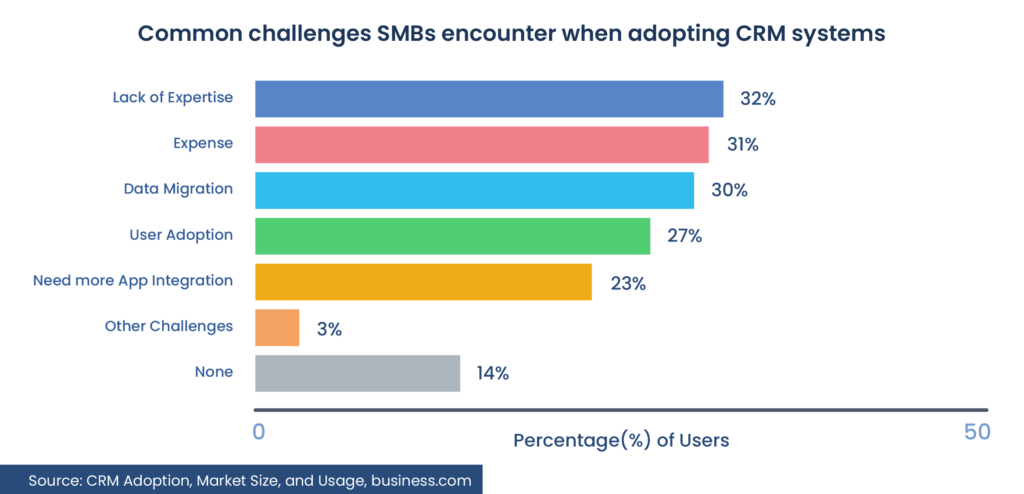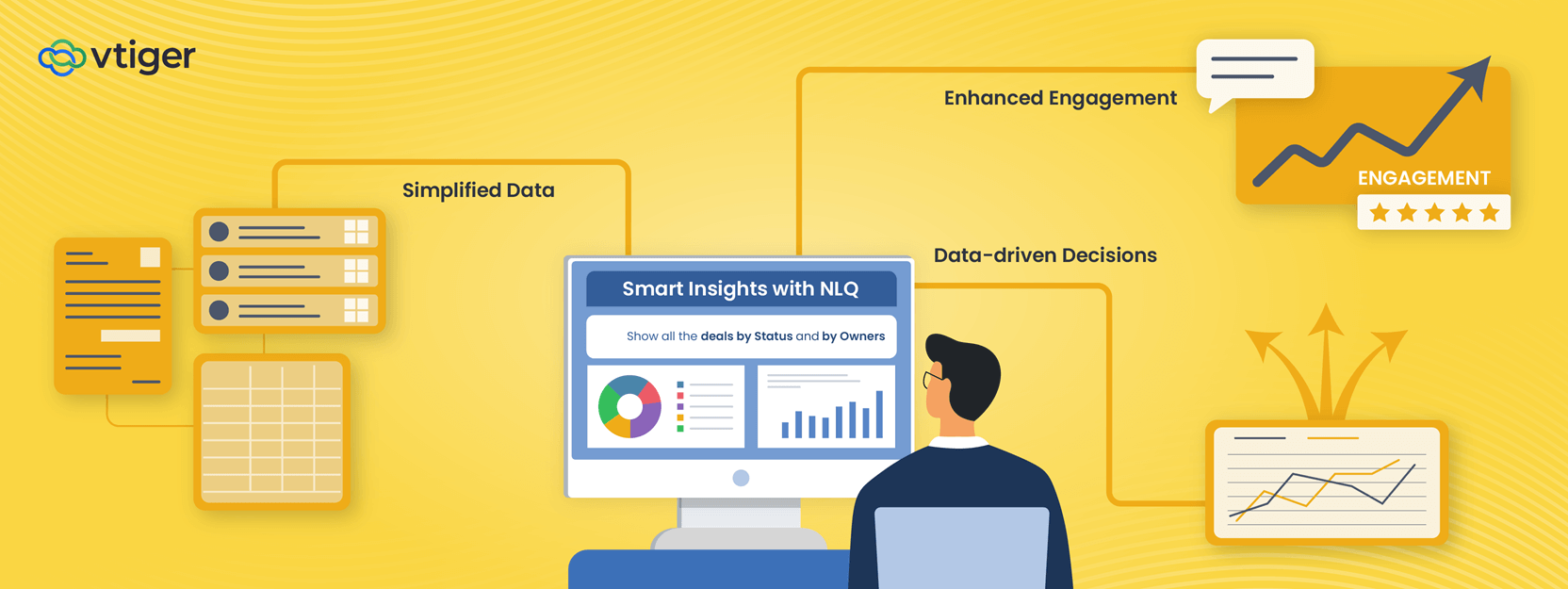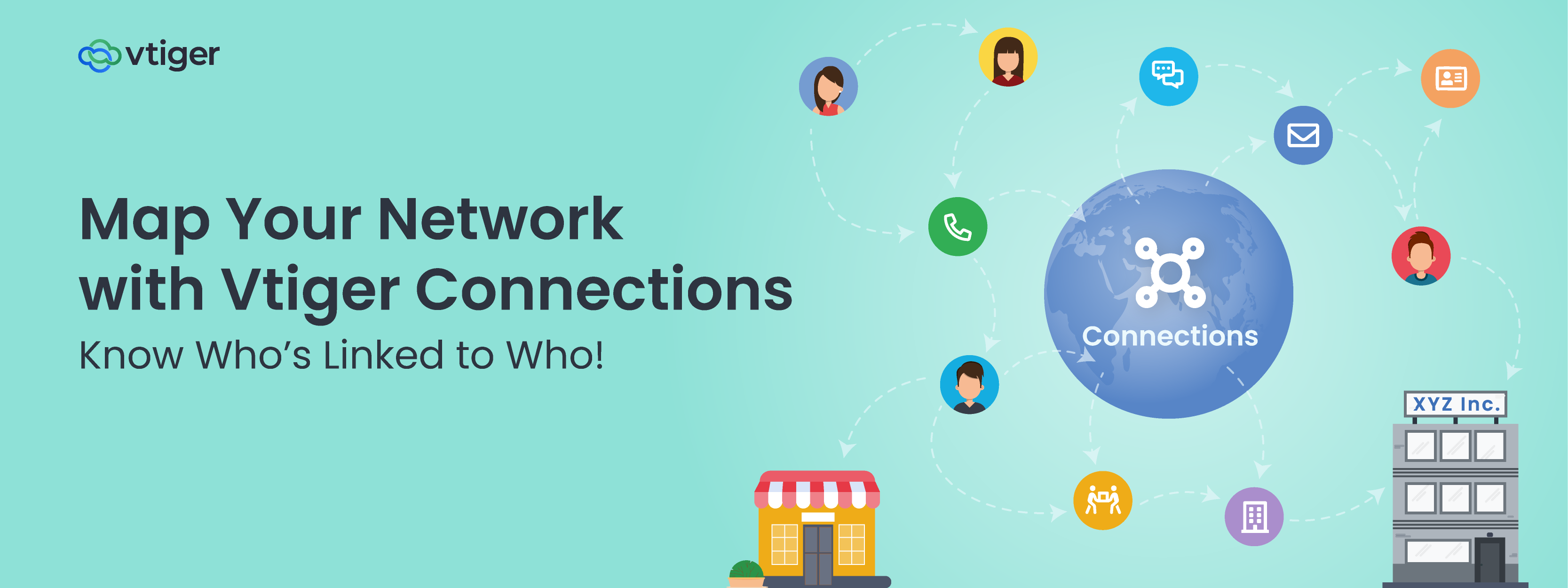Low CRM adoption in your business? NLQ can help! Our post explores how it simplifies data, boosts engagement, and empowers data-driven decisions.
Introduction
For many Small and Medium Businesses (SMBs), switching to a Customer Relationship Management (CRM) system might feel like trying to fly a jet. These systems often have complex interfaces, cryptic jargon, and the need for technical expertise that can leave even the most enthusiastic team member feeling overwhelmed. This is reflected in the data on the adoption of CRMs. Inbound marketing leader HubSpot reports that about 50% of Sales Managers say CRMs are challenging to implement.
But what if your CRM was designed to understand your needs? What if it could converse with you in plain English, just like a human assistant who finds the information you are looking for without making you do all the hard work?
This is the exciting new frontier of NLQ (Natural Language Querying) in CRM. With this technology, sales teams can ask your system questions like, “Who are my top customers in California?” or “What products are frequently bought together?” instead of clicking through menus and figuring out how to write database queries. They get clear, insightful answers instantly.
CRM systems have been around for a long time, but their adoption – especially in SMBs, has needed to be improved by the inherent complexity of these applications. Convincing busy team members to learn yet another confusing business application or adapting their way of working to comply with system requirements can be a massive challenge -leading to poor adoption of these tools despite thousands of dollars of investments.
NLQ removes the steep learning curve – it is just about making CRM easier; it’s about democratizing data access and empowering everyone in your organization to unlock valuable customer insights.
Join us as we delve into NLQ + CRM and explore how it can be a game-changer for your business.
Understanding NLQ and CRM
1. Natural Language Querying (NLQ):
The wave of AI sweeping the business world has left us drowning in a barrage of acronyms, many confusingly similar. So, let’s get some clarity on what NLQ is. The technology allows you to interact with data using everyday language instead of writing complex code or queries.
Here’s what that means for someone using a CRM that supports NLQ:
- There is no coding or structured syntax involved: NLQ lets you ask questions about data in plain English (the predominant language as of now). This makes insights accessible to everyone in your organization, regardless of their technical expertise. What previously required extensive product knowledge can now be achieved in minutes without worrying about where the data is stored and how it is organized.
- Queries take a Conversational approach: Without NLQ, one would need to know database table structures or, at the very least, where to look for the required data and how it is organized. With NLQ, however, one can phrase your questions naturally. So, instead of searching for the correct column names in the customer database and creating pivots, you could ask, “What’s the average customer spending in the West?” This is a huge step forward in reducing the complexity of data queries since users don’t need to know how the data is organized in the CRM.
- Unveiling data insights: NLQ acts as a translator, retrieving the information you need and presenting it in a way that’s easy to grasp. Users can carry out complex queries that would have been extremely difficult previously to surface new relationships and insights.
2. Customer Relationship Management (CRM)
Now, let us focus on the second acronym. Building solid relationships with your customers is critical in the business world. CRMs like Vtiger One are systems that help you achieve just that. CRMs are secure repositories of customer information that enable teams to collaborate and have up-to-date information on deals, support tickets, and marketing campaigns across various channels and touchpoints.
You can think of CRMs as a digital Swiss knife that helps you:
- To centralize and organize customer information: From contact details and purchase history to preferences and interactions, CRM keeps all your customer data securely in one place. All teams work from a single source of information and are always in sync.
- To better manage customer interactions: CRMs help to easily track communications, schedule appointments, and log customer interactions, ensuring a smooth and personalized experience that drives customer engagement.
- To drive and boost customer engagement: CRM systems offer powerful tools to automate tasks, like sending targeted marketing campaigns and tracking support tickets to provide exceptional customer service, ultimately fostering more robust customer relationships.
So, we now have a fair sense of a CRM system and NLQ technology. But why does NLQ seem to hold so much promise to empower SMBs to extract better ROI and value from their CRM investments?
Before understanding why NLQ can be a game changer, we must step back and understand why SMBs struggle with CRM adoption.

Common challenges SMBs encounter when adopting CRM systems

Despite these systems’ promising benefits, SMBs often need help adopting CRM systems. The above chart shows the top challenges stated by businesses when adopting the new system. Chances are you, too, will face a few of these.
Let’s take a closer look at some of the top ones listed here:
Firstly, there’s the issue of complexity. Many CRM platforms are designed for larger enterprises, making them overengineered and daunting for SMBs with limited resources and technical know-how. Navigating through the capabilities of these systems often requires a steep learning curve, which might mean spending thousands of dollars and person-hours on extensive training and ongoing support. SMB teams looking for tools to ease their work-life find this additional effort frustrating and non-value-adding.
Cost poses another significant barrier. Enterprise-grade CRM solutions usually have hefty licensing fees and subscription costs. They might even have additional implementation and maintenance charges. For SMBs, especially those operating on tight budgets, these expenses can be a substantial overhead, which deters them from investing in CRM solutions altogether.
Data quality stands as another critical concern. CRM is a tool, and its effectiveness depends on the accuracy and consistency of the data it holds. SMBs often need help maintaining data quality due to errors arising from manual entry, incomplete information, or a lack of established data governance protocols. We have all heard the adage “Garbage in Garbage Out.” Insufficient data can reduce the effectiveness of the CRM as a decision-making tool.
Lastly, integrating the CRM system with existing business tools and applications can present formidable challenges – mainly when the company uses proprietary tools that everyone is used to. Such integrations often prove complex and costly. Lack of integration can potentially lead to data silos, and information becomes fragmented across disparate systems.
SMBs have traditionally struggled with these challenges without the resources available to larger enterprises. These companies must be able to see ROI on their technology investment quickly and be able to deploy and drive utilization without having to spend hundreds of man-hours and further money on training and integrations with their existing business applications.
Having a layer of abstraction that hides away the complexity of the software and gets the user the relevant information without having to learn specialized commands or queries could be the key to solving these challenges.
Enter NLQ…
Why does NLQ have the potential to be a game-changer for SMBs?
The moment we look at NLQ as a layer on top of the complex underpinning technology, the advantages for SMBs become apparent almost immediately. As we saw above, CRM adoption is a big challenge for SMBs. While the business benefits are apparent to leadership and sales managers, the ground reality of migrating from spreadsheets or a simple contact management application to a CRM is very different.
When we dive deeper into the objections, the reality is sales and support team members want to do their job well – they don’t want to figure out how to navigate through more menus, click buttons, apply complex filters, or, good heavens, learn a database query language of some kind to get the information they need.
NLQ has the potential to significantly address these challenges, specifically in the areas of complexity, cost, and user adoption. Here’s how:
1. It leads to Increased Data Accessibility for Team Members: According to Ventana Research, only around 40% of organizations report that their teams can analyze data without the help of specialized IT resources. Using NLQ eliminates the need for team members to have technical expertise in data analysis. This means that SMBs, often with limited resources, can now empower their teams to leverage the power of their customer data in their CRM without relying on specialists or complex training. Even the junior team members can get all the relevant information they need for their tasks without learning the nuances of where the data resides in the CRM database.
2. It leads to Improved Efficiency and increased productivity: A study by Normal Nielsen Group found that support agents who used AI could handle 13.8% more customer inquiries per hour. Since users can ask questions and get answers quickly, they save valuable time and resources that can be better spent on other core business activities.
3. It leads to Deeper Customer Understanding and enhanced Customer Experience: Managers and Analysts who need to improve their technical skills to ask nuanced questions about their customer base, uncovering hidden patterns and trends that might be missed through traditional methods. Access to new insights empowers them to make data-driven decisions regarding marketing, sales, and customer service strategies. SMBs can now create sophisticated strategies to tailor interactions, address specific needs, and proactively address potential issues.
5. Leveling the Playing Field: NLQ empowers SMBs to compete more effectively with larger companies. They can gain valuable insights from their customer data, similar to larger enterprises with dedicated data analysis teams, without the associated overhead costs.
NLQ in CRM thus presents a game-changing opportunity for SMBs. It empowers them to bridge the knowledge gap, unlock the true potential of their data, and compete more effectively in the marketplace.
How does NLQ Work within your CRM?
In the context of CRMs, NLQ empowers users to ask questions about their customer data in a natural, conversational way.
Here is a straightforward overview of how it works:
Step 1: User asks a question: Imagine you want to know, “What are my top five customers by revenue this year?” in your CRM system.
Step 2: NLQ engine parses the question: The NLQ engine analyzes your question, identifying keywords and understanding the overall intent.
Step 3: Translation to CRM query: NLQ translates your question into a language the CRM system understands, often using a combination of searching, filtering, and aggregation functions.
Step 4: Data retrieval and presentation: The CRM system retrieves the relevant data and presents it in a user-friendly format, such as a list, chart, or dashboard.
At a very high level, NLQ acts as a bridge between users and their CRM data, making it easier to unlock valuable insights.
Key Considerations for NLQ-enabled CRM in SMBs
Choosing the Right Vendor
Diving into the world of CRM solutions can feel like a maze, especially when considering adding NLQ features. SMBs want to get the most out of their tools, right? So, picking the perfect vendor is key.
But let’s be honest; with so many options, it can be challenging to know where to start. That’s where the fun (and a little bit of stress) of the evaluation process kicks in. You’ve got to look at everything from NLQ capabilities to how easy the system is and whether it plays nicely with your other tools. It’s all about finding that perfect fit that matches your needs like a glove and sets you up for CRM success.
Here is a quick checklist of points to consider when choosing your CRM solution provider:
- Evaluate NLQ capabilities: Not all NLQ-enabled CRMs offer the same level of sophistication. SMBs should assess the specific functionalities and the range of natural language queries the system can handle.
- Consider user interface: A user-friendly interface is crucial for user adoption, especially for non-technical users. Choose a system that is intuitive and easy to navigate.
- Integration with existing tools: Ensure the CRM integrates seamlessly with existing business tools like email marketing platforms or accounting software to avoid data silos and streamline workflows.
- Scalability: Consider future growth and choose a scaled solution to meet your expanding needs.
Training Users
Let’s talk about getting your team up to speed with NLQ (Natural Language Query)! Now, NLQ might make querying data a whole lot simpler, but that doesn’t mean a little training won’t go a long way.
Think of it like this: even though NLQ takes the headache out of complicated queries, giving your users some basic training can help them get the most out of it. We’re talking about showing them the ropes, helping them understand what NLQ can do, and giving them tips on asking the right questions to get the best results.
Plus, it’s all about fostering that spirit of curiosity and exploration! Encourage your team to dive in, play around with NLQ, and see how powerful it can be to tackle their specific tasks and needs. After all, the more they know, the more they can do with it!
- Invest in basic training: While NLQ eliminates complex queries, providing basic training can help users understand the system’s capabilities.
- Focus on best practices: Train users on best practices for formulating clear and concise questions to get the most accurate and insightful results from the NLQ engine.
- Encourage exploration: Foster a culture of exploration by encouraging users to experiment with the NLQ functionality and discover its potential for their specific needs.
Ensuring Data Security and Privacy
Finally, let’s discuss something super important: keeping your data safe and sound! When diving into the world of CRM, ensuring your data and privacy are secure is vital. You should thoroughly understand how the NLQ engine works and where all your data is being shared and stored to make the magic happen. As they say, the ‘Devil is in the details.’
- Choose a reputable vendor: Select a vendor with a strong track record of data security and privacy practices.
- Understand data storage and access: Be transparent about where your data is stored, who has access to it, and what security measures are in place.
- Comply with regulations: Ensure the CRM solution adheres to relevant data privacy regulations like GDPR or CCPA.
Tips and Best Practices for Maximizing Value
Just as Rome wasn’t built in a day, AI algorithms don’t yield immediate ROI. These models are crafted to learn and evolve. Setting realistic goals and expectations is vital to reap the benefits ultimately. While AI algorithms excel in certain areas from the get-go, such as data discovery by uncovering valuable insights hidden within documents, understanding the nuances and contextual information required by team members involves patience and time to fine-tune.
To avoid disappointment, keep the following points in mind:
- Start with small goals: Identify specific questions or tasks that NLQ can address initially, allowing users to experience the benefits and build confidence.
- Focus on data quality: Ensure data accuracy and consistency within the CRM to ensure reliable results from NLQ queries.
- Regularly review and refine: Regularly assess how you’re using NLQ and identify areas for improvement. Refine your approach based on user feedback and data insights.
- Seek continuous improvement: Stay updated on the evolving capabilities of NLQ technology and explore new functionalities offered by your chosen CRM vendor.
By carefully considering these factors and implementing best practices, SMBs can leverage the power of NLQ-enabled CRM to gain valuable customer insights, streamline operations, and achieve sustainable business growth.
Conclusion
For SMBs, building strong customer relationships is paramount to success. However, navigating the complexities of traditional CRM systems can be daunting, often leading to low user adoption and hindering the full potential of these valuable tools. This is where NLQ emerges as a game-changer, transforming how SMBs interact with customer data.



